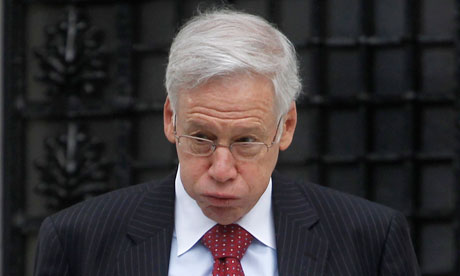Helena Smith in Athens and Larry Elliott guardian.co.uk,
Thursday 12 January 2012 20.22 GMT
Greece could default on debts if talks with investors break down and it fails to secure the next tranche of bailout cash

Charles Dallara, head of the Institute of International Finance, has said 'some key issues remain unresolved' after a two-hour meeting in Athens with finance minister Evangelos Venizelos. Photograph: Petros Giannakouris/AP
Greece and its private-sector creditors are involved in a race against time to finalise a debt writedown deal over the next 48 hours that will prevent the troubled country from defaulting on its massive debts.
The body negotiating on behalf of investors is adopting a tough stance amid concerns that a breakdown in the talks would result in Greece failing to secure the next tranche of its bailout cash from the European Union, the European Central Bank and the International Monetary Fund.
Charles Dallara, who heads the Washington-based International Institute of Finance, which is acting on behalf of private investors, said "some key areas remained unresolved" after a two-hour meeting with Greece's finance minister Evangelos Venizelos.
"Discussion will continue in Athens [on Friday] but time for reaching an agreement is running short," Dallara said in a statement.
"It is essential in order to finalise the voluntary agreement that support be given by all official parties in the days ahead."
Venizelos expressed confidence that the talks would be successful, with European leaders hopeful that a resolution of the Greek crisis will take pressure off other vulnerable eurozone countries.
The euro rose on exchanges after a successful bond auction in Spain and upbeat comments from the president of the ECB, Mario Draghi. Interest rates on 10-year Spanish and Italian bonds fell sharply, although analysts warned that it was far too early to say the eurozone was out of danger.
Banks, insurance companies, pension funds and hedge funds holding Greek debt are under pressure to accept a 50% writedown – or "haircut" – on their investments in a bond-swap scheme. This crucial reduction would slice around €100bn (£82.6bn) from its €205bn government debt, which would save Athens around €5bn in debt servicing costs and cut its debt pile from 160% of GDP to 120% by 2020 – a ratio that officials – not least in Germany, the main provider of EU rescue funds – see as much more sustainable.
Piling on the pressure, the Greek government warned that without the second financial aid package – announced by EU leaders in October but delayed by wrangling over the bond swap – the nation would inevitably default on the €14.5bn of maturing debt it will have to repay on 20 March, a nightmare scenario for the rest of the eurozone.
"Once the details of the deal are agreed there are several more weeks of paperwork and actually getting the private sector to implement it," said a senior Greek government official. "The intention is to have the basic agreement, at least, wrapped up by the time the troika [inspectors from the EU, ECB and IMF] arrive next week."
In recent weeks, however, speculation that private investors would be forced to make further concessions and accept an even bigger writedown in the value of bonds has fuelled uncertainty over the scheme.
Acknowledging the difficulty officials were having in attracting the private sector's approval, Greece's deputy finance minister, Filippos Sachinidis, hinted on Thursday that the EU may have to increase rescue funds for Athens if creditors refused to sign up to the deal. That development would inevitably incur the wrath of taxpayers in other eurozone countries. So far the ECB – the biggest holder of Greek bonds – has remained steadfast in its refusal to participate in the deal.
"If the percentage of participation is not, for instance, 100%, then Greece may need further support from the side of our partners to cover the financial gap," Sachinidis told a local radio station.
His comments chimed with those of Christine Lagarde, the IMF's managing director, who this week warned that, after months of missing fiscal targets, Greece's economic outlook looked little better than when the crisis erupted two years ago in the wake of revelations that the country's deficit was three times bigger than originally thought. The IMF chief also raised the prospect of the EU adding yet more money to the €130bn bailout it agreed in October, saying that if such a deal proved impossible, holders of private debt would have to accept even bigger losses.
The seeming inability of Greece to improve its economic indicators despite an unprecedented austerity programme fuels persistent speculation over whether it will remain in the single currency.
But polls have shown that despite unemployment hitting a record 18.5% and a barrage of wage cuts and tax increases demanded by international creditors in return for aid, the vast majority of Greeks are against reverting to their old currency, the drachma.
Greece races to tie up writedown deal before debt repayments fall due | Business | The Guardian
![The [Greek] European Tragedy](https://blogger.googleusercontent.com/img/b/R29vZ2xl/AVvXsEiWKI5s90SFm1wWTk6bs4p7CgslaC2SnYPsrZhb-B-smOufNNCSxCvpBLI9hOB-LsXZjir_PNmEiMk2-E62F3xkg96IoC6QFAaZAnPRTVH340IN9WBRmWJqPkjWlgyRj3zpALp7h6hvA58/s920/GkBack_new.jpg)